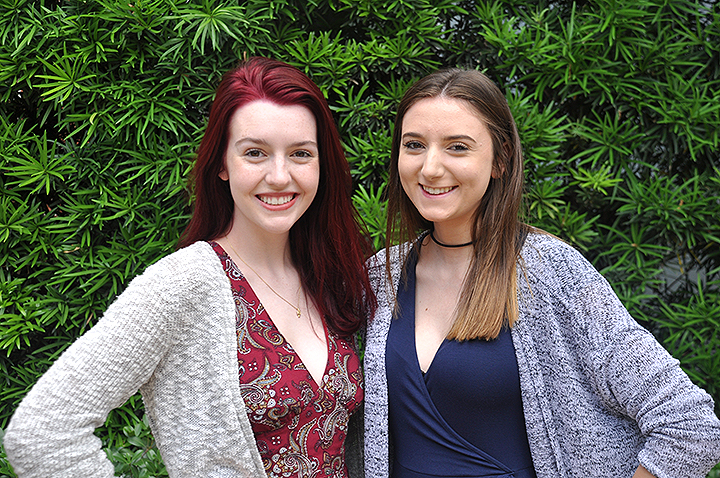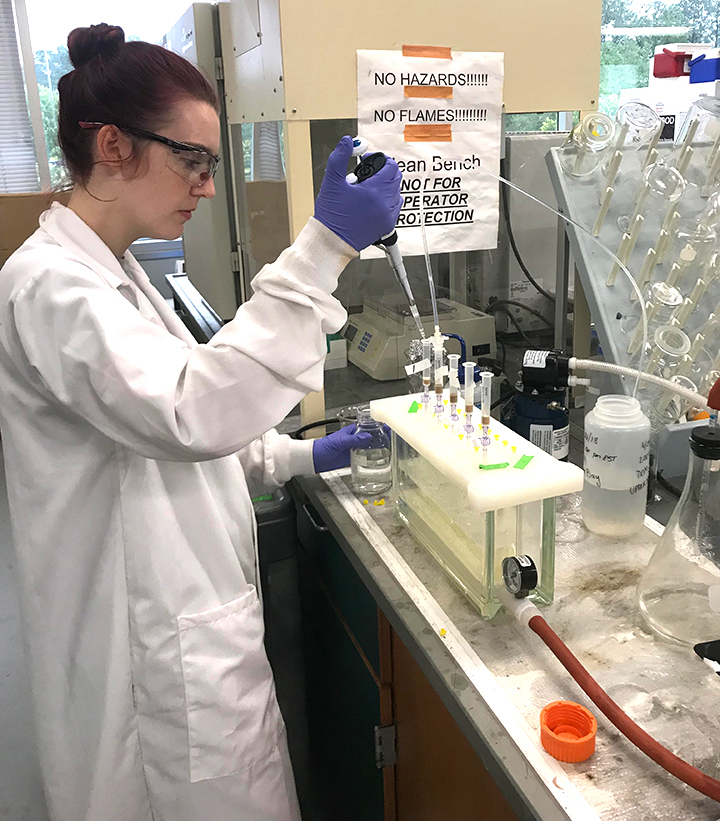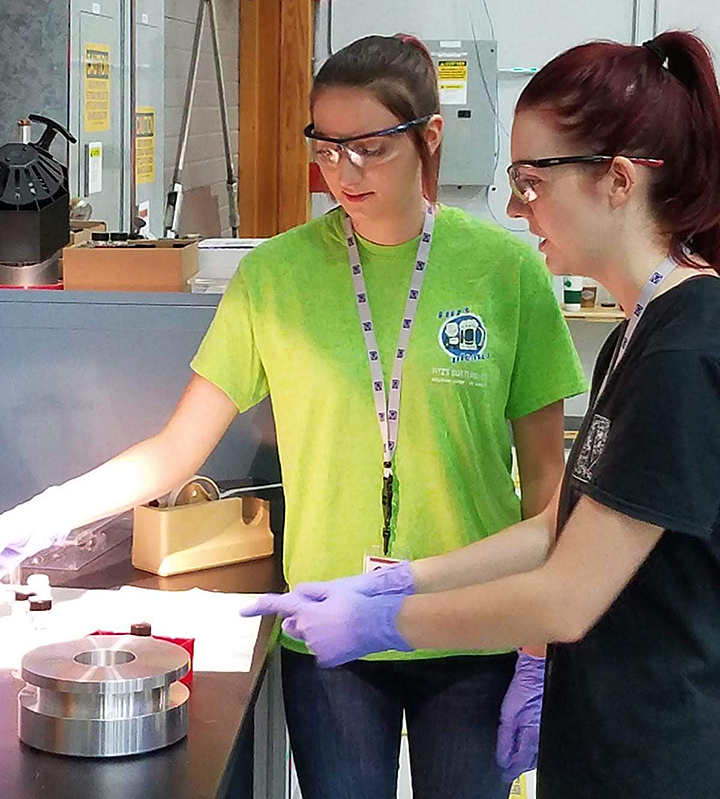Published: July 19, 2018
UT Forensic Science Juniors Are Learning to Drive in a Ferrari
Carley Reid and Miranda Conley are forensic science majors who have had nearly the same schedules since their first year at UT. They are both juniors, who met through the Schools App on Facebook and have been roommates ever since.
So it should come as no surprise that when it came to research, the two headed off together this summer to participate in a National Science Foundation Research Experiences for Undergraduates (REU) program hosted by the National High Magnetic Field Lab, which is housed at Florida State University. The students are working with a UT alumna, Amy McKenna ’05, who is a research faculty member at the field lab.

Carley Reid and Miranda Conley are forensic science majors participating in a National Science Foundation Research Experiences for Undergraduates (REU) program hosted by the National High Magnetic Field Lab.
“An REU provides students with the chance to develop a relationship with a researcher who is at the top of their field, and as such provides an opportunity for both professional and personal growth,” said Rob Masserini, assistant professor of chemistry. “The undergraduate experience focuses on answering questions, but the development of scientifically relevant questions is what drives science forward. An REU is a golden opportunity to learn this crucial skill first hand.”
While intimidated by the experience, both Reid and Conley said they were excited for the opportunity.
“Dr. Masserini described it as learning to drive in a Ferrari with this equipment that we’re using,” Reid said, though Masserini later attributed that to McKenna. “This will be the first time either of us have used this exact technique to do something. Obviously, that’s pressure because we’re doing this in front of people who are paying us and who believed in us enough to give us this opportunity, but you know what? Pressure is good. I’d rather have pressure and make myself want to do better and strive for more than feel comfortable. So hopefully it will make things easier for us when we do take our forensic chemistry courses when we are using the mass spec here at school. It’s going to be a doozy.”
The students are studying water quality, or more specifically, the dissolved organic matter (DOM) in compounds in Lake Okeechobee and Tampa Bay. McKenna said both projects will be ongoing to catalogue the molecular signature in these two water bodies over an extended period of time, which is the result of degrading plants and animals. At the end of the summer, Reid and Conley will present their research in a poster session to the entire National High Magnetic Field Laboratory.
“We're looking at things like how nutrients are being utilized in the presence of the DOM,” Reid said. “So our analysis with Fourier Transform Ion Cyclotron Resonance Mass Spectrometry (FT-ICR-MS) is the only technique that can actually look at DOM on the molecular level and tell the specific makeup of it. Once we know what it is, we can start thinking about how it affects the ecosystem.”

Reid performs Solid Phase Extraction (SPE) to separate the dissolved organic matter from seawater.
Conley’s work has focused on determining if organic alkalinity has a significant impact on total alkalinity (TA), a measure of water's ability to resist pH changes such as acidification.
“In ongoing monitoring of the total alkalinity in Tampa Bay, it was uncovered that the calculated TA was very different from measured TA. It was hypothesized that this discrepancy was due to the dissolved organic carbon (DOC) and the resulting organic alkalinity that comes from plants that line the coast,” said Conley, of St. Louis, MO. “My project is seeking to characterize DOC found in samples and determine their effect on TA data, and eventually uncover the effects of organic alkalinity on total alkalinity.”
The relationship with McKenna has been a highlight for Conley, who said she’s been a mentor for them.
“Not only is she extremely intelligent, she is also an excellent teacher and coach to us, she is relatable and is funny,” Conley said.
McKenna is modeling behavior from her own experiences on UT’s campus.
“When I was an undergraduate, one professor from UT changed the course of my life. Dr. Steve Hendrix took the time to interact with me doing hands on research in my junior year and encouraged me to apply to graduate school,” McKenna said. “Without that interaction, I would not be where I am today. The REU program gives me an opportunity to interact one on one in a research-driven setting, where I get to show students how science really works. It’s messy and we don’t always know the answer, and we have a lot of fun trying to figure out the answers.”

Conley and Reid prepare samples to be run in Negative Electrospray Ionization and Fourier Transformation Ion Cyclotron Resonance Mass Spectrometry (-ESI FT-ICRMS) to gather data on the samples’ composition.
Sometimes it just takes jumping in for students to feel more confident. While Conley and Reid were nervous about going into this experience, their tenacity has helped them grow in their pursuit of knowledge. Conley wants a career in drug chemistry or digital forensics, and Reid is considering the field of law enforcement or perhaps becoming a professor.
“The biggest thing that I’ve gained confidence-wise is that even the Ph.D.s in the lab have to ask questions and consult other experts, and they’re not afraid to ask questions or be wrong,” said Reid, a general chemistry labor mentor from Palatka, FL. “They’re all learning each day just like I am, and it’s made me realize the extent to which science is about asking questions instead of knowing the answers to them right away.”
Have a story idea? Contact Jamie Pilarczyk, Web Writer
Subscribe to News and UT Life stories
Read more UT Life stories
